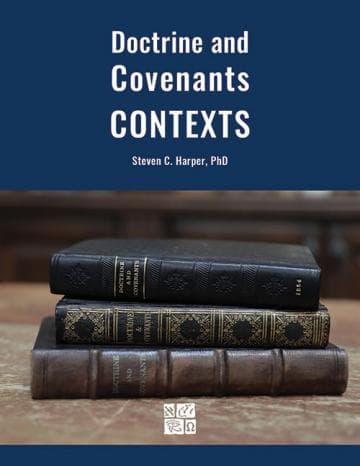Book
136 Chapters

James Covel was a Methodist minister and president, in fact, of a Methodist conference in western New York. Early in 1831 James came to Joseph and said he had covenanted with the Lord to obey any command the Lord gave him through Joseph. The Lord gave Joseph section 39 for James.[1]
The Lord reveals how well he knows James and that his heart is now right. The great sorrow of James’s past stems from his pride and worldly cares, which have led him to reject Christ many times, but the day of his deliverance has come. The Lord commanded James to “arise and be baptized, and wash away your sins” and receive the Holy Spirit.
If James will obey the law of the gospel, the Lord has greater work for him to do: preaching the fulness of the gospel, which Christ has sent forth as a covenant to recover the house of Israel. James will have power, great faith, and the Lord to go before him. The Lord has called him to build the Church so that Zion may rejoice and flourish. James is called to go to west to Ohio.
James Covel broke his covenant. Almost immediately he “rejected the word of the Lord” in Section 39 “and returned to his former principles and people.” Joseph and Sidney wondered why, and the Lord explained in section 40.[2]
The order of events in section 40 is important. First, James Covel made a covenant with an honest heart. He sincerely received the gospel. Then Satan tempted him to fear the persecution that would result, to worry about giving up his paid ministry for a lay one. James chose to follow those fears and cares, resulting in a broken covenant.
This sequence highlights how revelation facilitates agency. A person has agency, or power to act independently, only when they know what God wants, Satan poses an alternative, and they are free to choose between the two (see section 29). Given section 39, James knew just what the Lord wanted him to do. Then Satan countered the commandments. James was free to choose between the two. He chose to break his covenant, making it null and void.
Some have cited sections 39 and 40 as evidence that Joseph Smith was a fraud. They contend that these sections prove that Joseph’s God did not even know that James Covel would not obey. That conclusion depends on a particular conception of God that is not evident in Joseph’s revelations. The Lord who spoke through Joseph Smith does not function in that agency-robbing way. Joseph’s revelations distinguished between the sovereignty of God and the agency of individuals (see section 93). Joseph truly taught that “God sees the secret springs of human action, and knows the hearts of all living,” but it did not follow for Joseph that God caused bad behavior.[3] “I believe that God foreknew everything, but did not foreordain everything,” Joseph taught profoundly. “I deny that foreordain and foreknow is the same thing.”[4]
In other words, God did not make James Covel break his covenant. Rather, the Lord gave James power to make and keep his covenant and the agency to decide whether to make and keep it for himself. Revelation gives us knowledge of God’s will. It makes us free to choose. Section 40 explains that James Covel made and broke his covenant of his own free will. It is a more significant revelation than one might assume based on its brevity.
[1] “History, 1838–1856, volume A-1 [23 December 1805–30 August 1834],” p. 91, The Joseph Smith Papers, accessed July 25, 2020.
[2] “History, 1838–1856, volume A-1 [23 December 1805–30 August 1834],” p. 92, The Joseph Smith Papers, accessed September 25, 2020.
[3] “Letter to William W. Phelps, 11 January 1833,” p. 19, The Joseph Smith Papers, accessed July 25, 2020.
[4] “History, 1838–1856, volume C-1 [2 November 1838–31 July 1842],” p. 1014, The Joseph Smith Papers, accessed September 25, 2020.
Book
136 Chapters
Items in the BMC Archive are made publicly available for non-commercial, private use. Inclusion within the BMC Archive does not imply endorsement. Items do not represent the official views of The Church of Jesus Christ of Latter-day Saints or of Book of Mormon Central.